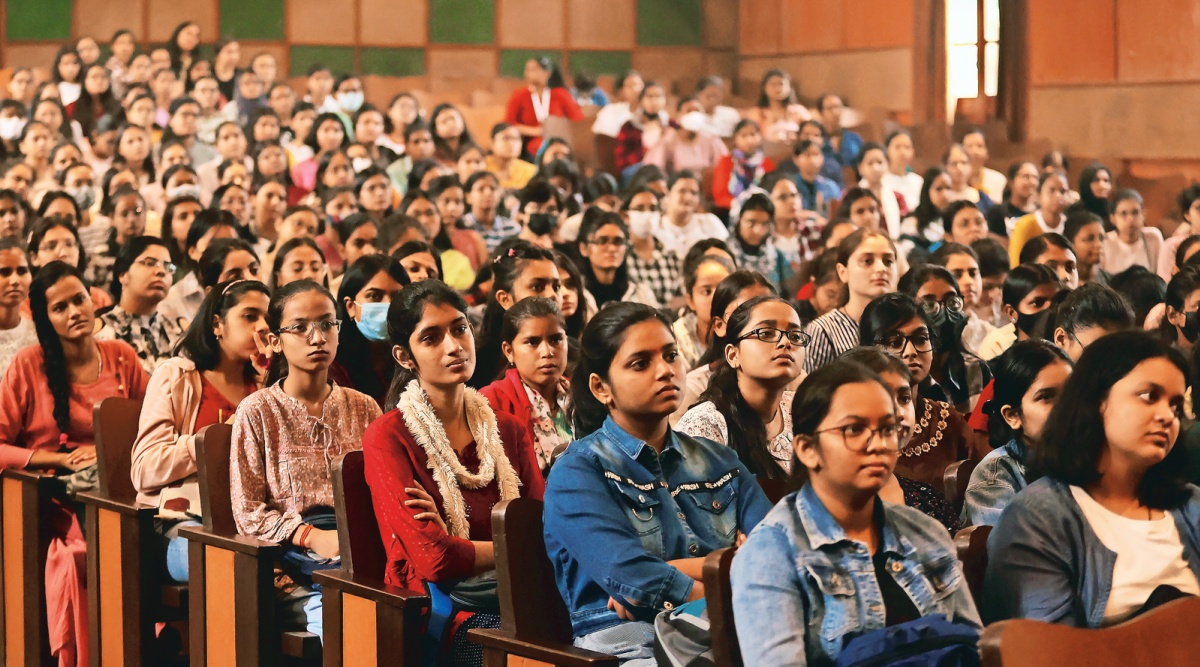 DU is a public university and has done much to bring to life the principles of representation to historically marginalised communities. (File)
DU is a public university and has done much to bring to life the principles of representation to historically marginalised communities. (File)Written by Krishnakumar S
The gross enrolment ratio in higher education institutions in India has seen a steep increase in recent years. In particular, there has been a hike in the number of first-generation learners at college. Widely referred to as the “massification of higher education”, the share of people in the age group 18 to 23 age group pursuing higher education has increased to 27.3 per cent, as per the All India Survey on Higher Education (AISHE) Report. This is far higher compared to the 6 to 9 per cent at the beginning of the century. Despite the growth of higher education facilities in the rest of the country, Delhi University (DU) continues to attract more and more students.
Higher education in the liberal arts must go beyond engaging with the world of ideas of Voltaire or Keynes or Walter Benjamin. It should also offer an ecosystem of exchanges across cultures in a cosmopolitan environment. Needless to say, in our country, it should also be affordable. This is what makes DU such an attractive destination.
There was a time, till the mid-Nineties, when the charm of DU was confined to the North Campus. But, as the university grew to cater to the constantly growing demand, colleges in other parts of the city too began to make a mark. The highly competitive environment has resulted in one feeling relieved in getting a seat anywhere in the university. With the same curriculum being taught across colleges – often, from and a far better one compared to many other universities in the country, the student stands to benefit.
For students, encountering a plurality of cultures in a home away from home is important. This demolishes the stereotypical thinking so many of us are brought up with. The sense of belonging with people who are not from our family, village, city or state goes a long way in transcending boundaries and creating understanding. Perhaps this model – several liberal arts colleges within a small area catering to students with the same course content – has worked to DU’s advantage.
DU is a public university and has done much to bring to life the principles of representation to historically marginalised communities. Such universities are a fine fusion of Nehruvain optimism about public education and Ambedkarite principles of representation.
Private universities, on the other hand, are often unaffordable. Former HRD Minister Arjun Singh — in a reflective lecture at Delhi University – stated, there should expansion, accommodation and excellence in the higher education sector. No one would dispute that there has been an expansion of higher education in India. On the principles of distributive justice, some states – Kerala, for example — saw colleges being set up in every constituency. Should a state have so many colleges or should there be concentrated clusters of learning, attracting students from all over the state and beyond?
Certain others focussed on setting up self-financing engineering colleges — Tamil Nadu and Karnataka for instance. Yet others, like Andhra Pradesh, wooed private education majors. Across metropolises, we have industrialists and academic entrepreneurs setting up universities known for their great liberal ethos. But they are unaffordable.
Most of these models have failed on either the principles of affordability or on assuring quality.
Many states are failing to retain teaching talent. In certain states, the hike in the pay and allowances as per the 2008 Guidelines have only resulted in capitation fees for college teaching posts rising.
In attracting talented students and giving them exposure to a rich extra-curricular environment in a cosmopolitan city, Delhi University has been a success. From a period when it catered to a minuscule elite, DU now is a truly broad-based institution. It has also been able to retain talented teachers, but it must address the long-pending issue of ad hocism permeating the faculty. Else, the sheen of one of the best universities in India will dim.
Krishnakumar S teaches economics at Sri Venkateswara College, University of Delhi